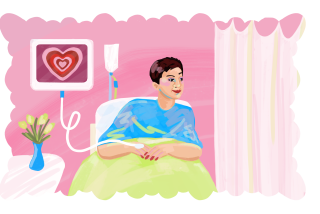A Doctor and Her Friends
- Share via
The doctor said I had come on “a bad day.” She didn’t elaborate, but I could guess. Alexandra Levine treats cancer and AIDS patients, and she has this sweet but dangerous way of becoming their best friends. When a patient slips, which inevitably is often, a part of Levine slips with them, and this makes for many bad days.
I first met Levine in 1984, while preparing an article on the L.A. County-USC Medical Center. She let me follow along one afternoon as she went to tell a patient that her cancer had returned, a development that almost certainly meant death. Levine was distraught.
“I love this woman,” she said.
The patient, a Korean nightclub singer, spoke no English. Levine sat down, peered deep into the woman’s eyes and, without diverting her stare, explained vaguely to an interpreter that something funny had turned up on a slide, that more tests were needed. Nothing more was said. It took me a while to grasp that Levine had delivered the bad news, not with words, but with her eyes.
“She knows,” the doctor said later. “She knows.”
I never forgot the moment. Although I never spoke with Levine in the eight years since, I sometimes wondered about her. She had emerged as a medical star, an international expert on cancer and especially AIDS. She also, I assumed, had lost many more patients. I was curious how she was holding up, whether professional prominence and eight years of more death had changed her. And so on Wednesday I paid a visit.
Levine was rushing. She had to catch a flight to Mexico City, and had forgotten her passport, and her secretary was insisting there were “7,000 things” that needed her attention, and still there were patients to worry about. This was not a day for small talk.
She spoke of the satisfaction, glamour even, of running with the elite of AIDS research, of not only knowing the right questions, but also a few of the answers. But there is a price. There is less time to teach, to pursue other causes she considers important. Travel takes her away from her patients, not always at the best of times. Now 46, she regrets not having children.
Other things had happened in her life. Both her parents died of cancer in the late 1980s--”the one time in my life when I just couldn’t be optimistic.” She drifted into administration for a while, to avoid dealing with cancer patients, and she did a lot of thinking about her relationships with the dying.
Levine had told me in 1984 that she considered patient death a defeat, personal and professional--a heavy load for a doctor who deals with AIDS. This view, though, seems to have softened. “Hippocrates did not say that we had to cure everybody,” she said. “He said that we’re to comfort and try to heal.”
From her grief over her parents, Levine discovered she was not as emotionally exposed at work as she had thought, that all along a thin measure of professional reserve had been protecting her. “As close as I am with patients,” she said, “it was different with my own parents.”
Still, she continues to put herself in a position to make friends of her patients, and watch them die. It’s not something you leave at the office. “I carry a lot with me,” Levine said. “The negative is to lose all of these friends. On the other hand, I was enriched by them, and I make a very sincere attempt to surround myself with those people.” She pointed to the artwork that adorns her small office. It all was created by patients who are now dead.
She brought from her desk a picture of a young man seated on a couch, smiling. This man was her first AIDS patient. The discoveries Levine made through this one patient had catapulted her into the galaxy of the world’s leading AIDS doctors. He died in August, at age 32.
“Thank you for being here,” the man had written. “I love you.”
Alexandra Levine has many stories to tell, about death and AIDS and being a doctor, but this was not a good day to pry them loose, and I doubt there ever will be one. After 45 minutes it was time to go. I was in the elevator when I remembered one more question.
“Do you remember that Korean woman?” I asked, sticking my head through the door. “The one who liked to sing?”
Levine did.
“Well,” I said, trying to sound appropriately funereal, “what happened?”
“Oh,” Levine said. “She’s OK. I don’t see her anymore, but she’s OK. She made it.”
So there was that, anyway.
Understand, there is no larger message in all this, no lesson particularly apt for California. I offer Dr. Levine only as a simple reminder that, in a time of preoccupation with villains and victims, in a place where celebrity passes for substance, there still are a few heroes out there.
More to Read
Sign up for Essential California
The most important California stories and recommendations in your inbox every morning.
You may occasionally receive promotional content from the Los Angeles Times.














